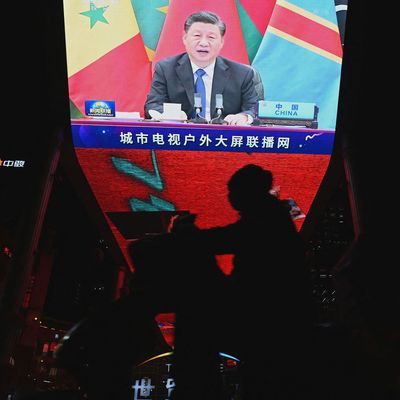
What will 2022 bring in the worlds of tech, media, and politics? On the latest episode of the Pivot podcast, Kara Swisher and Scott Galloway solicit predictions from Senator Amy Klobuchar, author Cory Doctorow, and CNBC’s Andrew Ross Sorkin, who believes big business’s relationship with China may change dramatically.
Kara Swisher: Our first prediction comes from one of our BFFs, Andrew Ross Sorkin, co-anchor of CNBC’s Squawk Box.
Andrew Ross Sorkin: Hey, Kara and Scott. My prediction of 2022? In a way we’ve never seen before, western companies are going to be grappling with China and human rights. Of course, so much of Silicon Valley has already left China, but many companies remain, like Apple and Elon Musk’s Tesla. And this year, in large part because of the Beijing Winter Olympics, the globe is going to be exposed to so many of the issues that are taking place there. It is going to challenge these companies to rethink their stances. It is potentially going to create hearings in Washington and elsewhere. And we are going to see lots of headlines and hard decisions that need to be made.
Subscribe on:
Scott Galloway: The Canadian, weighing in.
Kara Swisher: What a good voice he has. He has such a nice voice, doesn’t he? I kind of just believe anything he says.
Galloway: Very handsome online.
Swisher: He does sound handsome, and he is in fact handsome.
Let me say, I think this is interesting. You know, tech companies have been in and out of China — Yahoo, LinkedIn, Google. But I’m not going with this one. Even though there’s a lot of anti-Chinese talk out there and the story on Tim Cook’s secret deal with China has gotten a lot of attention, and forced labor, obviously, is a major issue — I just don’t know if it’s not going to be business as usual. Scott, what do you think?
Galloway: I think he’s half-right, I think there will be a lot of headlines because the stories are dramatic and there is a real inconsistency, and we still have this delusion that the better angels of American companies’ CEOS are going to show up, and we’re hoping they’ll fill the void — and some have. There’s Ken Frazier, Marc Benioff … CEOs who are filling this kind of vacuum or trying to address the externalities. But I’m not sure Americans really care, and I know that’s a terrible thing. I bet there’re more stories about Didi’s potential delisting than there are about the internment camps of the Uyghurs. I think Americans talk a big game, but I think we’ve lost a lot of moral authority in the world when we have our own insurrections and our own income inequality, and our own vaccine hesitancy. I’m not sure that China is all that concerned about what we say. And I think Americans are still going to buy iPhones regardless of where Apple manufactures them. I think there’ll be a lot of headlines — I guess that will help to increase pressure. But I think it’s optimistic to think that big American companies will take that sort of stand and withdraw from China. None of these companies we’ve mentioned withdrew from China because of what I would call moral reasons.
Swisher: Well, Google did — it was spying. It was spying. But yeah, I agree with you.
Galloway: I hope he’s right. I don’t think he is. And also, quite frankly, Trump, and what I’ll call the lying and the corruption that was the Trump administration, has lessened our moral authority around the world to ask anything of anybody.
Swisher: Which is ironic since Trump was quite anti-China in a lot of ways, although he also embraced them. That was such a weird situation.
Academic researchers estimate that the Chinese government has placed more than one million people into internment camps. Again, we’ve had a history of that in this country, but …
Galloway: Jesus, can you believe that?
Swisher: The question of forced labor will be interesting as more light is shed on this, which is very difficult in terms of reporting it. There are some bills aimed at that: The Uyghur Labor Prevention Act would require U.S. companies to guarantee you not use imprisoned or coerced workers from the predominantly Muslim region. So we’ll see.
This transcript has been edited for length and clarity.





























